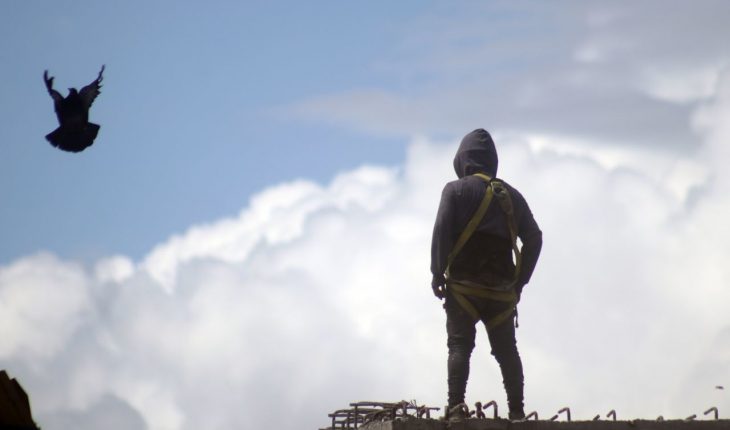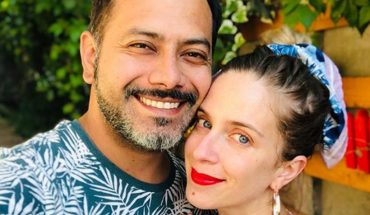The COVID death of Ricardo, his father, took 16-year-old Ivan out of school. Instead of being in the first year of high school, the teenager has had to work as a bricklayer’s assistant and sell sweets.
There are days he arrives at his house with only 200 pesos, which he gives to his mother, Maria de Lourdes, to help with the expenses of the two of them and his three brothers. Marlén, 14; Joseph, 13, and Christian, 6.
COVID-19 changed this family’s life completely. They lost their father, Ricardo, who was the main breadwinner. On September 23, 2020, he died at the IMSS La Raza hospital in Mexico City.
Read: Bowling shoes at home and selling candy in trucks, a mother’s way to cope with the COVID crisis
I worked in a restaurant. The owner’s daughters contracted COVID and he was designated to bring them food while they quarantined. He started with symptoms and a few days later he lacked air. Mary of Lourdes also became ill. She did not need to be admitted to the hospital. But from one week to the next she was widowed in charge of four children.
In Mexico, three out of every thousand children have lost at least one of their parents or primary caregivers in this COVID-19 pandemic, according to the results of a study done by the University of Oxford and published by the scientific journal The Lancet.
Children who face this orphanage are exposed to poverty, abuse and institutionalization. They are children who from one or two weeks to the next have lost who was their main financial support or their main emotional support.
According to the results of the research, globally, from March 1, 2020 to April 30, 2021, it is estimated that one million 134 thousand children lost their primary caregivers, including at least one of the parents or grandparents in custody.
While one million 562 thousand children faced the death of at least one primary or secondary caregiver. Two to five times as many children have deceased fathers as deceased mothers.
The country with the most children orphaned by COVID, among the 21 that were evaluated in the study, is Peru with ten per thousand, South Africa, with 5 per thousand, followed by Mexico, with 3 per thousand (a total of 131,325 children), Brazil and Colombia, with two per thousand , and Iran, Argentina, Russia and the United States, with one per thousand.
María de Lourdes and her children had to leave the house they rented and go to live with their maternal grandparents. The man, 56, is a bricklayer, because of the pandemic his work was greatly reduced and now, from time to time, he barely gets any work. The grandmother, 54, suffers from her heart and can no longer make much effort. He worked in a quesadilla business, but had to leave the job because of ill health.
You may be interested: They have a job, but salary is not enough: pandemic increases labor poverty in Mexicans
The family has not benefited from any government program. No one has come close to offering them support. On the part of the father’s work they did not get more than a thousand pesos for the funeral expenses. He was in one of those precarious jobs that are already the majority in the country, where people are for fees and have no benefits. They did not have social security, in La Raza they received it because they are accepting those affected by the virus, even if they are not their beneficiaries.
When Ricardo died, Maria de Lourdes was sick, it took months to recover, she had sequelae, so far she says that she still gets coughing fits. He also fell into a severe depression. The eldest son became the head of the family, at the age of 15, and set out to look for work.
The Lancet notes as part of the study that orphanhood and caregiver deaths are a hidden pandemic associated with COVID-19 deaths, and says the data show the need for an additional pillar in the response to the epidemic, including preventing more deaths and caring for these children.
“Ivan arrived all tired, with his hands and shoulders all hurt to upload the material, so I decided that even with how bad I was I had to go out to get a job, I said, no, I have to go to work, son, that responsibility is mine, “says María de Lourdes.
The woman got a job making tortillas, in a place of cravings, where she works from 8 in the morning to 6 in the afternoon and earns 250 pesos a day. But although his mother already had a job, Ivan did not want to go back to school. He knows that the money he earns helps the breadwinner, which has now been joined by grandparents, who are also determined to earn some income.
“My mom sells sweets and sells chubby on the weekends. My other children help him in what they can. Everyone had to leave school last school year. There wasn’tto money for the internet or who helped them with lessons and homework, so they also lost the scholarships they received, “says María de Lourdes.
When he does not find work in construction, Ivan sells sweets, peanuts, what he can to earn a little money, there are times he does not sell anything, the most he has taken out are 200 pesos a day. “He puts a little food in the colony, here in Ex Ejido de Tepeolulco, in Tlalnepantla, State of Mexico, there he offers interns, peanuts, chocolates, popsicles, chewing gum.”
In November 2020, the Ministry of Public Education signed an agreement with other institutions to identify children and adolescents orphaned by the COVID-19 pandemic. The goal is to give them priority access to the Benito Juarez Welfare Scholarships, but for that they have to be in school.
For the coming school year, Maria de Lourdes is trying to get all her children back to school. “But I went to see the registrations and I have to pay 500 pesos of fee for each one. I haven’t had to complete. In addition you have to pay for material and tools. They ask for gel and soap, and that’s fine, but I don’t have to buy all that.”
The family has many expenses also because the youngest of the children, Cristian, gets sick very often from the airways and each time they pay for the consultation with a pharmacy doctor, and the medicines.
Of Ivan, Mary of Lourdes says she is trying to convince him that he should continue studying. “But he says no, he’s not going to catch up. All my children, especially the older ones, lost their dreams, their illusions. They used to say they wanted to do this and the other thing, go far. Now they say, but no, there is no money.”
Maria de Lourdes says that her children try to be well or appear to be well. “Since I got very depressed, I think they don’t want me to be like this again and they encourage me. If they’re wrong, they don’t say it, so I don’t get bad. But I know Ivan, for example, is very frustrated and desperate about the situation we’re in.”
Since COVID-19, says The Lancet study, can lead to death within a few weeks, families have little time to prepare children for the trauma they experience when the parent or caregiver dies.
Children orphaned are at increased risk of experiencing mental health problems; physical, emotional and sexual violence; and family poverty. These adverse experiences increase the risk of suicide, teenage pregnancy, infectious diseases such as HIV/AIDS and chronic diseases.
Psychosocial and financial support, the study stresses, can help families raise children deprived of their caregivers and help ensure that institutionalization is avoided.
Faced with the loss of Ricardo and the lack of any help, Maria de Lourdes says that they have nothing left but to feel like it. “Nobody cares that there are days you don’t even have to eat. I’m just like my husband, working six days a week, until Sundays, throwing tortillas, without health insurance, with nothing. My kids lost their year in school, I don’t know how they’re going to get into the next one, and nobody cares.”
What we do at Animal Politico requires professional journalists, teamwork, dialogue with readers and something very important: independence. You can help us continue. Be part of the team.
Subscribe to Animal Politico, receive benefits and support free journalism.#YoSoyAnimal





